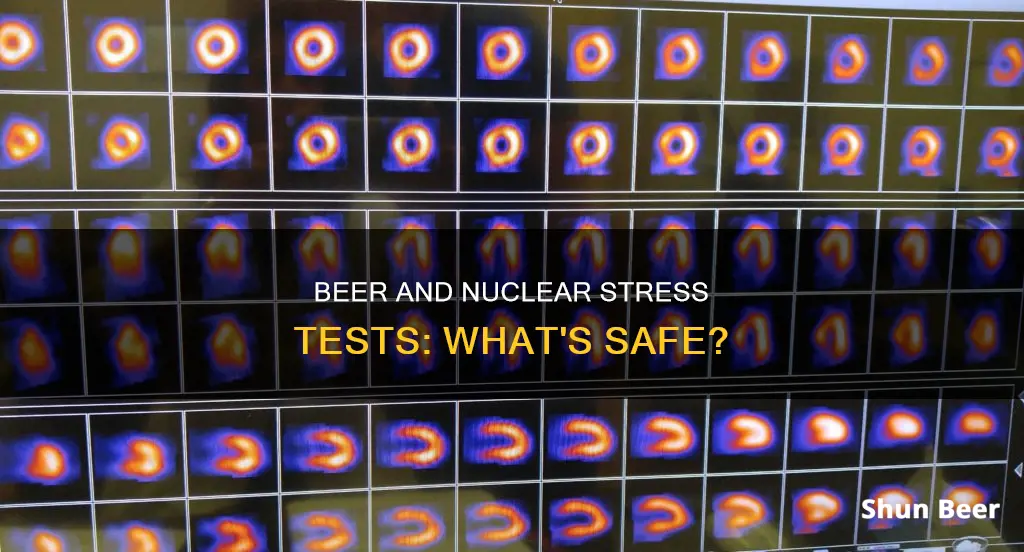
A nuclear stress test is a medical procedure that uses a tracer dye injected into the patient's arm to check how blood flows through their heart muscle. There are two types of nuclear stress tests: an Exercise Nuclear Perfusion Stress Test, which involves the patient exercising on a treadmill, and a Pharmacological Nuclear Perfusion Stress Test, which involves the administration of a drug for patients unable to exercise. In the context of this procedure, the question of whether one can drink beer before the test arises due to the pre-test restrictions on consuming certain substances. Beer, being an alcoholic beverage, falls under the category of substances that are typically prohibited before a nuclear stress test.
Nuclear Stress Test Instructions
| Characteristics | Values |
|---|---|
| Eating and drinking | Nothing to eat or drink after midnight before the test. |
| Caffeine | No caffeine products 24 hours prior to the test. |
| Alcohol | No alcohol 24 hours prior to the test. |
| Clothing | Wear comfortable clothes and walking shoes. |
| Lotion | Do not apply lotion to your chest on the day of the test. |
| Test duration | Approximately 3 hours. |
| Medication | Do not take daily oral medications unless instructed by your doctor. Do not take Aminophylline or Theophylline within 24 hours of your test. |
What You'll Learn

No eating or drinking after midnight before the test
If you are scheduled for an early nuclear stress test, it is important to remember that you should not eat or drink anything after midnight on the night before the test. This is because the test requires a clear view of your heart and its blood flow, and eating or drinking can interfere with this.
A nuclear stress test is a type of medical test used to evaluate the blood flow to your heart muscle. It involves injecting a tracer dye into your bloodstream, which can be seen by a special camera as it flows through your heart. This allows your doctor to see how well your heart is functioning and if there are any blockages in the blood vessels.
The test is often done in two parts, with the first set of images taken while you are at rest, and the second set taken after your heart rate has been raised through exercise or medication. This means the test can last several hours, so it is important to follow the instructions provided by your doctor to ensure it can be completed without issues.
Not eating or drinking after midnight is crucial because it ensures your stomach is empty, reducing the risk of nausea and vomiting during the test. It also reduces the likelihood of interference with the tracer dye, which could impact the accuracy of the test results. So, while it may be tempting to have a late-night snack or drink, it is important to avoid doing so for the best possible test results.
Beer Foam Stones: Do They Work?
You may want to see also

Avoid caffeine products 24 hours prior
A nuclear stress test is a medical procedure that requires you to follow certain instructions beforehand, including abstaining from caffeine products 24 hours prior. This instruction is essential for ensuring the accuracy and safety of the test.
Caffeine is a stimulant that can be found in a variety of products, including coffee, tea, soda, energy drinks, chocolate, and even some medications. It increases activity in the brain and nervous system, leading to enhanced mental alertness and physical energy. While caffeine can be a part of a healthy diet for most adults, excessive consumption can have negative consequences.
In the context of preparing for a nuclear stress test, avoiding caffeine is crucial. Caffeine can affect the results of the test, as it is a stimulant that increases heart rate and circulation. By abstaining from caffeine, the medical professionals conducting the test can obtain accurate readings and ensure the test's effectiveness.
Additionally, caffeine consumption can impact your overall well-being during the test. Since the test may involve physical activity, such as walking, caffeine's stimulating effects on the body could influence your comfort level and performance during the test. It is important to be in a relaxed state and maintain a steady heart rate to ensure the procedure goes smoothly.
Therefore, it is imperative to refrain from consuming any caffeine products 24 hours before your nuclear stress test. This includes not only coffee, tea, and soda but also chocolate, energy drinks, and medications that contain caffeine. By following this instruction, you can help ensure the accuracy and safety of the test, as well as your own comfort and well-being during the procedure.
Beer and Vodka: Mixing Alcohol Safely
You may want to see also

Wear comfortable, two-piece clothing
If you have a nuclear stress test coming up, you'll want to be as prepared as possible. One important instruction is to wear comfortable, two-piece clothing. Here are some tips to help you choose the right outfit:
Firstly, it's important to avoid one-piece dresses or jumper-style suits. Instead, opt for a two-piece ensemble that is comfortable and easy to move around in. A simple, comfortable outfit could be a pair of trousers and a sweater, or a t-shirt and a cardigan. You could also wear a skirt and a top, or a blazer with jeans. It's a good idea to choose clothing that is loose-fitting and made from breathable fabrics. This will ensure you're comfortable during the test, which can take up to three hours to complete.
If you're looking for something more stylish, there are plenty of fashionable two-piece options available. For a chic look, try a blazer with matching shorts or trousers. You could also experiment with co-ord sets, which typically include a top and bottom in the same colour or pattern. These can be dressed up or down, and the separate pieces can often be mixed and matched with other items in your wardrobe. For a more casual option, a comfortable ribbed bra and shorts set or a sweater and trousers combination can be a great choice.
When choosing your outfit, it's important to keep in mind that you should avoid applying lotion to your chest on the day of the test. Additionally, family members or friends will not be allowed to wait in the testing area, so you may want to avoid wearing anything that you feel uncomfortable being alone in. Ultimately, the key is to wear something that makes you feel confident and at ease during the procedure.
The Science Behind Foam Beer Koozies: Do They Work?
You may want to see also

Don't apply lotion to your chest on the day
It is important to follow the instructions provided by your doctor or the testing facility before a nuclear stress test. One of the instructions for the day of the test is to not apply lotion to your chest. This is because the test involves imaging your heart, and certain products can interfere with the procedure.
Lotions, creams, and oils can contain ingredients that can affect the results of a nuclear stress test. These products can leave a residue on the skin that may block or interfere with the absorption of the radioactive tracer that is used during the test. The tracer is typically rubbed on your chest, and it allows the camera to capture images of your heart. If the tracer does not absorb properly, the images may not be clear, and the test may need to be repeated.
Additionally, some lotions and creams may contain small amounts of alcohol or other ingredients that could interfere with the test. Alcohol can affect blood flow and heart rate, which are key factors in a nuclear stress test. Even if a lotion does not contain alcohol, it is best to avoid applying any products to the chest area to ensure that the test can be performed accurately.
By following this instruction and refraining from applying lotion to your chest on the day of the test, you can help ensure that the nuclear stress test proceeds as planned and provides accurate results.
It is also important to note that, in addition to not applying lotion, you should also avoid applying any other topical products to your chest, such as perfumes, deodorants, or powders. These products can also leave a residue or contain ingredients that may interfere with the test.
Beer O'Clock: When Work Lunches Need a Lift
You may want to see also

The test takes around three hours
A nuclear stress test is a procedure that uses radioactive material to examine the flow of blood into the heart muscle, both at rest and during activity. The test typically takes around three hours to complete.
On the day of the test, an intravenous (IV) line will be inserted into your arm or hand. A radioactive substance, such as thallium or sestamibi, will then be injected into one of your veins. You will be asked to lie down and wait for approximately 15 to 45 minutes. During this time, the radioactive substance will travel through your bloodstream and into your heart muscle.
After the waiting period, a special camera will be used to scan your heart and create images. These images will show how the radioactive substance has moved through your blood and into your heart, providing valuable information about blood flow. This process of scanning and imaging usually takes about 15 to 20 minutes.
Following the initial imaging, you will be asked to walk on a treadmill or pedal on an exercise machine. The speed and incline will gradually increase to raise your heart rate and simulate stress. If you are unable to exercise, a medication called a vasodilator will be administered to dilate your heart arteries. Alternatively, you may be given dobutamine to increase your heart rate and simulate exercise.
Once your heart rate reaches the desired level, a second injection of the radioactive substance will be administered. You will then rest for another 15 to 45 minutes before undergoing a second scan and imaging session. The entire procedure, including the exercise or stress portion and the mandatory wait time between images, typically lasts around three hours.
Does Open Beer Go Bad? Drinking It the Next Day
You may want to see also
Frequently asked questions
No, you should not drink beer before a nuclear stress test. You should not consume anything, including alcohol, after midnight on the day before your test.
A nuclear stress test is a way of checking blood flow through the muscle or walls of your heart. A tracer dye is injected into your arm through an IV, and a camera scans the tracer as it flows through your heart muscle.
You should not eat or drink anything after midnight on the day before your test. You should also avoid caffeine and cigarettes for 24 hours before the test. Wear comfortable clothes and walking shoes. Do not apply lotion to your chest on the day of the test.
During the test, you will first have scanning pictures taken while you rest. Then, you will exercise on a treadmill to increase your heart rate, or be given medication if you are unable to exercise. After the exercise, a second set of pictures will be taken. The test takes approximately three hours to complete.







